Juvenile Justice & Child Protection: Police Interrogation Rights
VerifiedAdded on 2023/06/13
|12
|3343
|188
Case Study
AI Summary
This case study examines the rights of a child during police interrogation, focusing on the role of a responsible adult and the concept of due process under the Children (Criminal Proceeding) Act 1987 (NSW). It analyzes a scenario involving an aboriginal girl, Millie, and the steps necessary to ensure her rights are protected during questioning. The study discusses the legislative options available to the police, ethical issues, and the importance of a responsible adult's presence to prevent coercion and ensure fair treatment. The analysis refers to relevant case law, such as R v Warren and R v Cotton, to highlight the legal standards and obligations concerning the interrogation of minors, emphasizing the need for police to act in a non-discriminatory manner and to respect the child's right to silence. Desklib provides resources for students, including past papers and solved assignments.
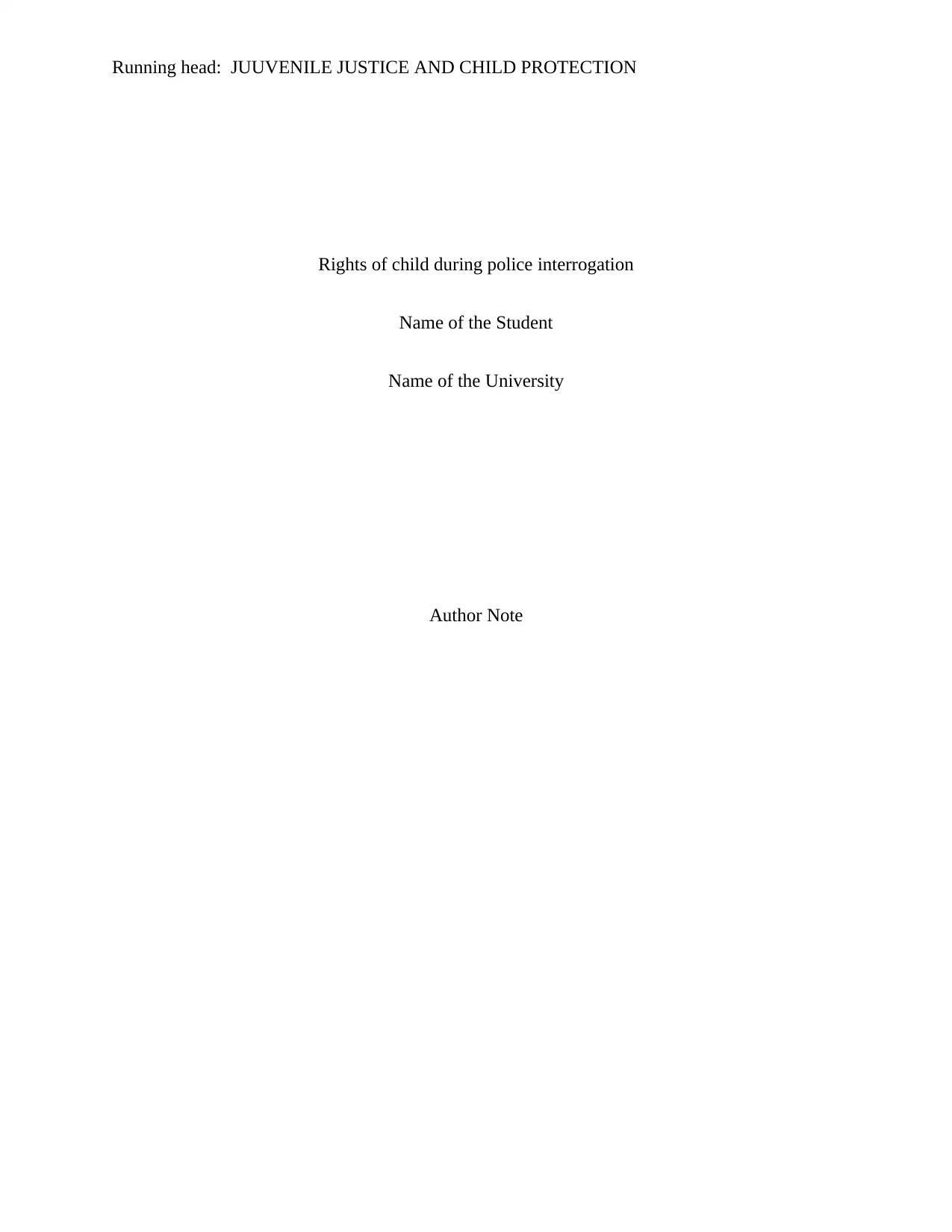
Running head: JUUVENILE JUSTICE AND CHILD PROTECTION
Rights of child during police interrogation
Name of the Student
Name of the University
Author Note
Rights of child during police interrogation
Name of the Student
Name of the University
Author Note
Paraphrase This Document
Need a fresh take? Get an instant paraphrase of this document with our AI Paraphraser
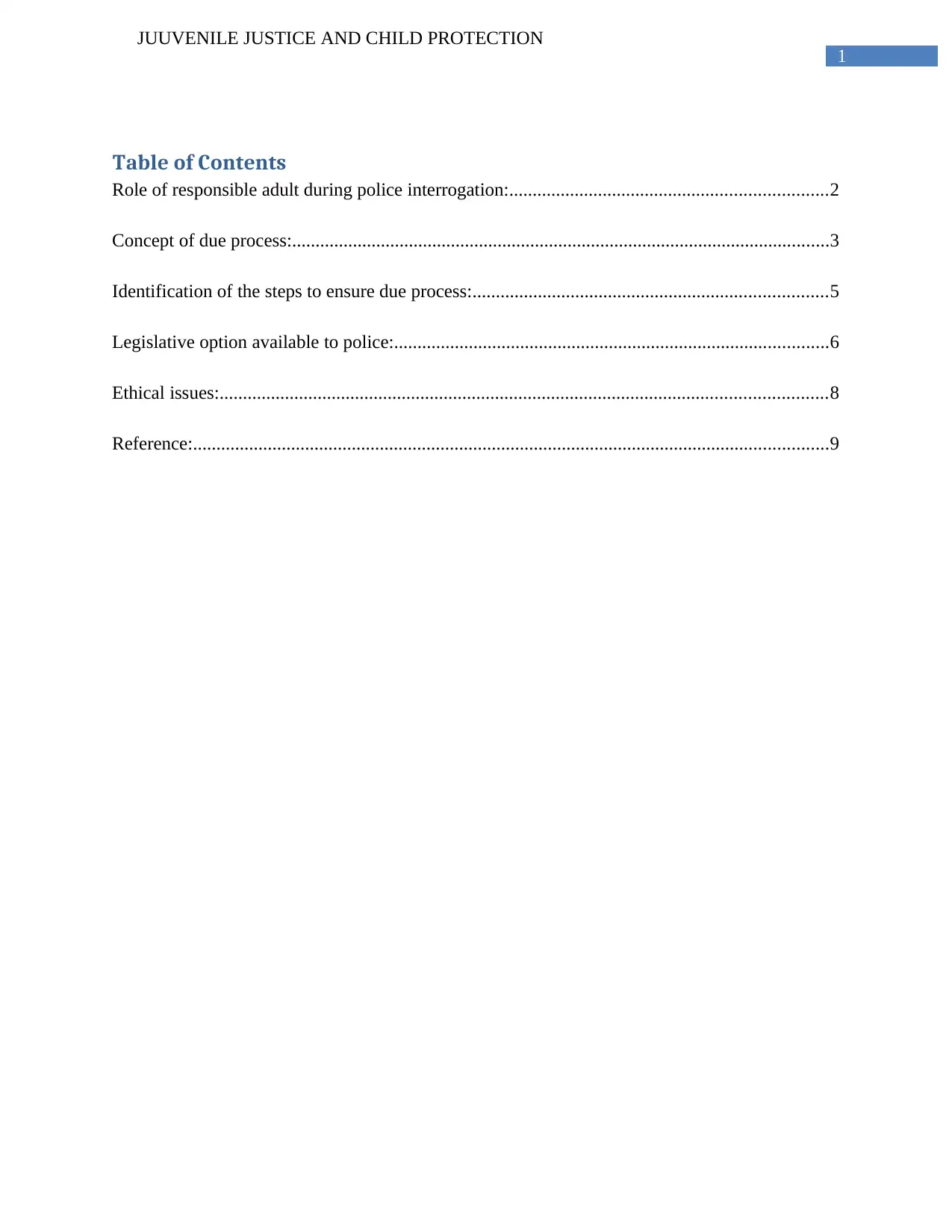
1
JUUVENILE JUSTICE AND CHILD PROTECTION
Table of Contents
Role of responsible adult during police interrogation:....................................................................2
Concept of due process:...................................................................................................................3
Identification of the steps to ensure due process:............................................................................5
Legislative option available to police:.............................................................................................6
Ethical issues:..................................................................................................................................8
Reference:........................................................................................................................................9
JUUVENILE JUSTICE AND CHILD PROTECTION
Table of Contents
Role of responsible adult during police interrogation:....................................................................2
Concept of due process:...................................................................................................................3
Identification of the steps to ensure due process:............................................................................5
Legislative option available to police:.............................................................................................6
Ethical issues:..................................................................................................................................8
Reference:........................................................................................................................................9
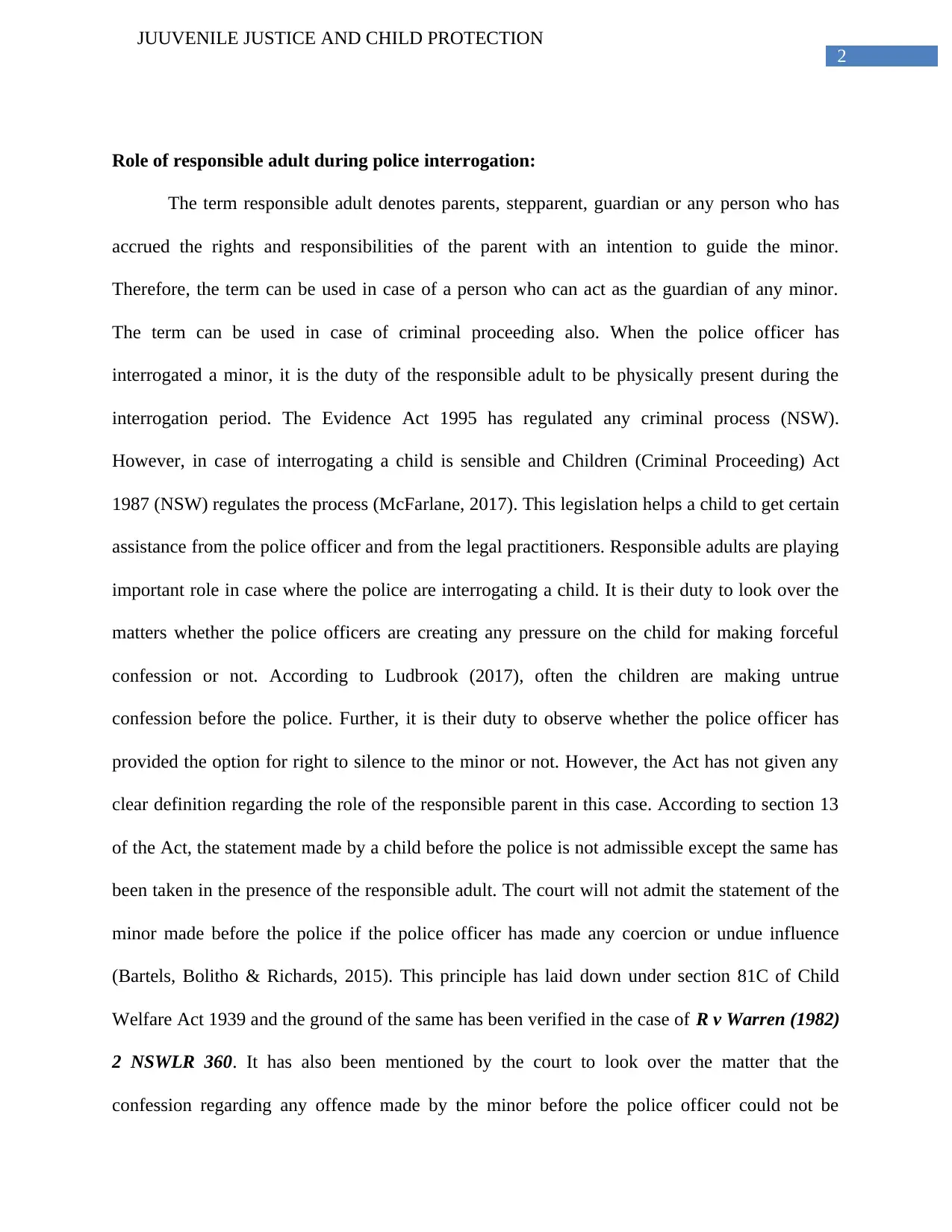
2
JUUVENILE JUSTICE AND CHILD PROTECTION
Role of responsible adult during police interrogation:
The term responsible adult denotes parents, stepparent, guardian or any person who has
accrued the rights and responsibilities of the parent with an intention to guide the minor.
Therefore, the term can be used in case of a person who can act as the guardian of any minor.
The term can be used in case of criminal proceeding also. When the police officer has
interrogated a minor, it is the duty of the responsible adult to be physically present during the
interrogation period. The Evidence Act 1995 has regulated any criminal process (NSW).
However, in case of interrogating a child is sensible and Children (Criminal Proceeding) Act
1987 (NSW) regulates the process (McFarlane, 2017). This legislation helps a child to get certain
assistance from the police officer and from the legal practitioners. Responsible adults are playing
important role in case where the police are interrogating a child. It is their duty to look over the
matters whether the police officers are creating any pressure on the child for making forceful
confession or not. According to Ludbrook (2017), often the children are making untrue
confession before the police. Further, it is their duty to observe whether the police officer has
provided the option for right to silence to the minor or not. However, the Act has not given any
clear definition regarding the role of the responsible parent in this case. According to section 13
of the Act, the statement made by a child before the police is not admissible except the same has
been taken in the presence of the responsible adult. The court will not admit the statement of the
minor made before the police if the police officer has made any coercion or undue influence
(Bartels, Bolitho & Richards, 2015). This principle has laid down under section 81C of Child
Welfare Act 1939 and the ground of the same has been verified in the case of R v Warren (1982)
2 NSWLR 360. It has also been mentioned by the court to look over the matter that the
confession regarding any offence made by the minor before the police officer could not be
JUUVENILE JUSTICE AND CHILD PROTECTION
Role of responsible adult during police interrogation:
The term responsible adult denotes parents, stepparent, guardian or any person who has
accrued the rights and responsibilities of the parent with an intention to guide the minor.
Therefore, the term can be used in case of a person who can act as the guardian of any minor.
The term can be used in case of criminal proceeding also. When the police officer has
interrogated a minor, it is the duty of the responsible adult to be physically present during the
interrogation period. The Evidence Act 1995 has regulated any criminal process (NSW).
However, in case of interrogating a child is sensible and Children (Criminal Proceeding) Act
1987 (NSW) regulates the process (McFarlane, 2017). This legislation helps a child to get certain
assistance from the police officer and from the legal practitioners. Responsible adults are playing
important role in case where the police are interrogating a child. It is their duty to look over the
matters whether the police officers are creating any pressure on the child for making forceful
confession or not. According to Ludbrook (2017), often the children are making untrue
confession before the police. Further, it is their duty to observe whether the police officer has
provided the option for right to silence to the minor or not. However, the Act has not given any
clear definition regarding the role of the responsible parent in this case. According to section 13
of the Act, the statement made by a child before the police is not admissible except the same has
been taken in the presence of the responsible adult. The court will not admit the statement of the
minor made before the police if the police officer has made any coercion or undue influence
(Bartels, Bolitho & Richards, 2015). This principle has laid down under section 81C of Child
Welfare Act 1939 and the ground of the same has been verified in the case of R v Warren (1982)
2 NSWLR 360. It has also been mentioned by the court to look over the matter that the
confession regarding any offence made by the minor before the police officer could not be
⊘ This is a preview!⊘
Do you want full access?
Subscribe today to unlock all pages.

Trusted by 1+ million students worldwide
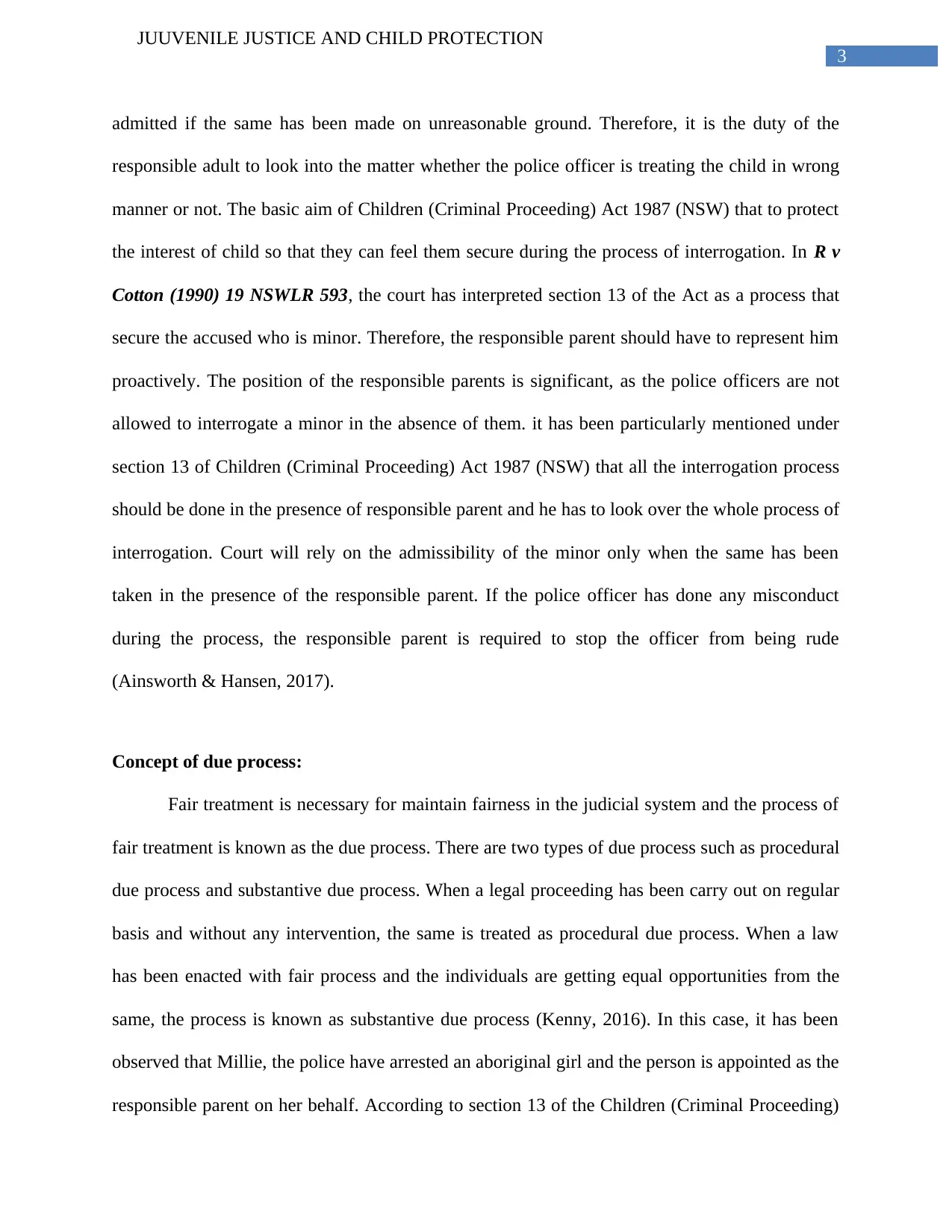
3
JUUVENILE JUSTICE AND CHILD PROTECTION
admitted if the same has been made on unreasonable ground. Therefore, it is the duty of the
responsible adult to look into the matter whether the police officer is treating the child in wrong
manner or not. The basic aim of Children (Criminal Proceeding) Act 1987 (NSW) that to protect
the interest of child so that they can feel them secure during the process of interrogation. In R v
Cotton (1990) 19 NSWLR 593, the court has interpreted section 13 of the Act as a process that
secure the accused who is minor. Therefore, the responsible parent should have to represent him
proactively. The position of the responsible parents is significant, as the police officers are not
allowed to interrogate a minor in the absence of them. it has been particularly mentioned under
section 13 of Children (Criminal Proceeding) Act 1987 (NSW) that all the interrogation process
should be done in the presence of responsible parent and he has to look over the whole process of
interrogation. Court will rely on the admissibility of the minor only when the same has been
taken in the presence of the responsible parent. If the police officer has done any misconduct
during the process, the responsible parent is required to stop the officer from being rude
(Ainsworth & Hansen, 2017).
Concept of due process:
Fair treatment is necessary for maintain fairness in the judicial system and the process of
fair treatment is known as the due process. There are two types of due process such as procedural
due process and substantive due process. When a legal proceeding has been carry out on regular
basis and without any intervention, the same is treated as procedural due process. When a law
has been enacted with fair process and the individuals are getting equal opportunities from the
same, the process is known as substantive due process (Kenny, 2016). In this case, it has been
observed that Millie, the police have arrested an aboriginal girl and the person is appointed as the
responsible parent on her behalf. According to section 13 of the Children (Criminal Proceeding)
JUUVENILE JUSTICE AND CHILD PROTECTION
admitted if the same has been made on unreasonable ground. Therefore, it is the duty of the
responsible adult to look into the matter whether the police officer is treating the child in wrong
manner or not. The basic aim of Children (Criminal Proceeding) Act 1987 (NSW) that to protect
the interest of child so that they can feel them secure during the process of interrogation. In R v
Cotton (1990) 19 NSWLR 593, the court has interpreted section 13 of the Act as a process that
secure the accused who is minor. Therefore, the responsible parent should have to represent him
proactively. The position of the responsible parents is significant, as the police officers are not
allowed to interrogate a minor in the absence of them. it has been particularly mentioned under
section 13 of Children (Criminal Proceeding) Act 1987 (NSW) that all the interrogation process
should be done in the presence of responsible parent and he has to look over the whole process of
interrogation. Court will rely on the admissibility of the minor only when the same has been
taken in the presence of the responsible parent. If the police officer has done any misconduct
during the process, the responsible parent is required to stop the officer from being rude
(Ainsworth & Hansen, 2017).
Concept of due process:
Fair treatment is necessary for maintain fairness in the judicial system and the process of
fair treatment is known as the due process. There are two types of due process such as procedural
due process and substantive due process. When a legal proceeding has been carry out on regular
basis and without any intervention, the same is treated as procedural due process. When a law
has been enacted with fair process and the individuals are getting equal opportunities from the
same, the process is known as substantive due process (Kenny, 2016). In this case, it has been
observed that Millie, the police have arrested an aboriginal girl and the person is appointed as the
responsible parent on her behalf. According to section 13 of the Children (Criminal Proceeding)
Paraphrase This Document
Need a fresh take? Get an instant paraphrase of this document with our AI Paraphraser
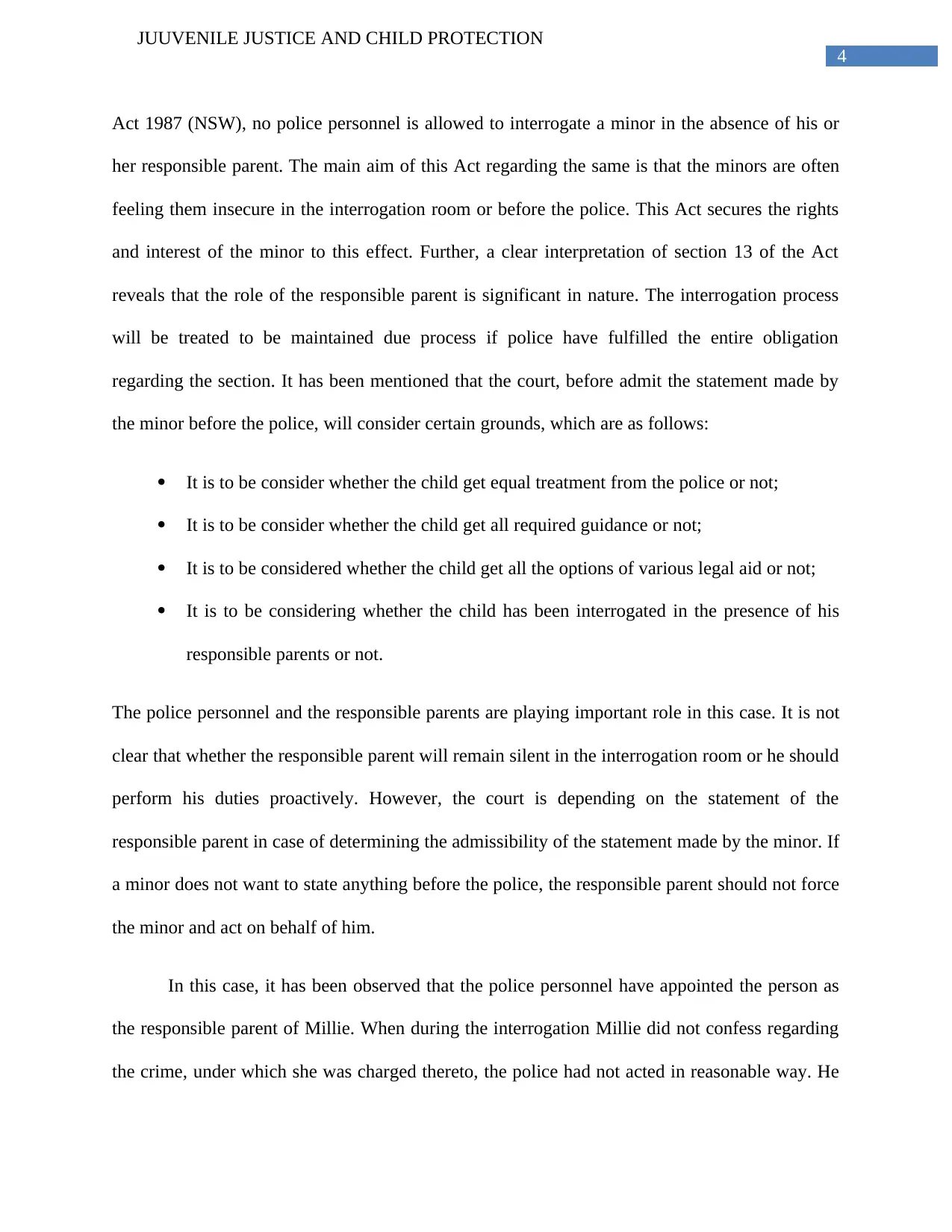
4
JUUVENILE JUSTICE AND CHILD PROTECTION
Act 1987 (NSW), no police personnel is allowed to interrogate a minor in the absence of his or
her responsible parent. The main aim of this Act regarding the same is that the minors are often
feeling them insecure in the interrogation room or before the police. This Act secures the rights
and interest of the minor to this effect. Further, a clear interpretation of section 13 of the Act
reveals that the role of the responsible parent is significant in nature. The interrogation process
will be treated to be maintained due process if police have fulfilled the entire obligation
regarding the section. It has been mentioned that the court, before admit the statement made by
the minor before the police, will consider certain grounds, which are as follows:
It is to be consider whether the child get equal treatment from the police or not;
It is to be consider whether the child get all required guidance or not;
It is to be considered whether the child get all the options of various legal aid or not;
It is to be considering whether the child has been interrogated in the presence of his
responsible parents or not.
The police personnel and the responsible parents are playing important role in this case. It is not
clear that whether the responsible parent will remain silent in the interrogation room or he should
perform his duties proactively. However, the court is depending on the statement of the
responsible parent in case of determining the admissibility of the statement made by the minor. If
a minor does not want to state anything before the police, the responsible parent should not force
the minor and act on behalf of him.
In this case, it has been observed that the police personnel have appointed the person as
the responsible parent of Millie. When during the interrogation Millie did not confess regarding
the crime, under which she was charged thereto, the police had not acted in reasonable way. He
JUUVENILE JUSTICE AND CHILD PROTECTION
Act 1987 (NSW), no police personnel is allowed to interrogate a minor in the absence of his or
her responsible parent. The main aim of this Act regarding the same is that the minors are often
feeling them insecure in the interrogation room or before the police. This Act secures the rights
and interest of the minor to this effect. Further, a clear interpretation of section 13 of the Act
reveals that the role of the responsible parent is significant in nature. The interrogation process
will be treated to be maintained due process if police have fulfilled the entire obligation
regarding the section. It has been mentioned that the court, before admit the statement made by
the minor before the police, will consider certain grounds, which are as follows:
It is to be consider whether the child get equal treatment from the police or not;
It is to be consider whether the child get all required guidance or not;
It is to be considered whether the child get all the options of various legal aid or not;
It is to be considering whether the child has been interrogated in the presence of his
responsible parents or not.
The police personnel and the responsible parents are playing important role in this case. It is not
clear that whether the responsible parent will remain silent in the interrogation room or he should
perform his duties proactively. However, the court is depending on the statement of the
responsible parent in case of determining the admissibility of the statement made by the minor. If
a minor does not want to state anything before the police, the responsible parent should not force
the minor and act on behalf of him.
In this case, it has been observed that the police personnel have appointed the person as
the responsible parent of Millie. When during the interrogation Millie did not confess regarding
the crime, under which she was charged thereto, the police had not acted in reasonable way. He
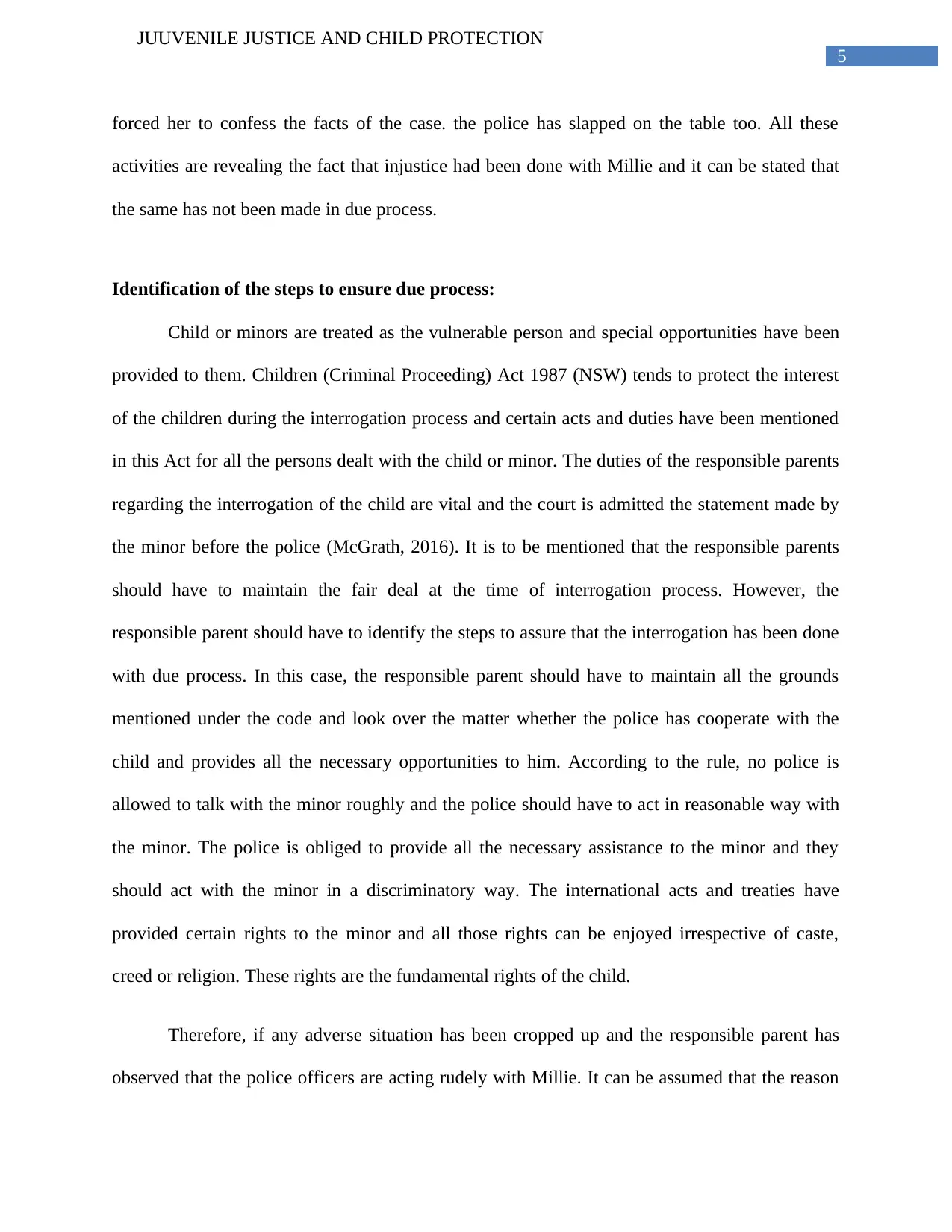
5
JUUVENILE JUSTICE AND CHILD PROTECTION
forced her to confess the facts of the case. the police has slapped on the table too. All these
activities are revealing the fact that injustice had been done with Millie and it can be stated that
the same has not been made in due process.
Identification of the steps to ensure due process:
Child or minors are treated as the vulnerable person and special opportunities have been
provided to them. Children (Criminal Proceeding) Act 1987 (NSW) tends to protect the interest
of the children during the interrogation process and certain acts and duties have been mentioned
in this Act for all the persons dealt with the child or minor. The duties of the responsible parents
regarding the interrogation of the child are vital and the court is admitted the statement made by
the minor before the police (McGrath, 2016). It is to be mentioned that the responsible parents
should have to maintain the fair deal at the time of interrogation process. However, the
responsible parent should have to identify the steps to assure that the interrogation has been done
with due process. In this case, the responsible parent should have to maintain all the grounds
mentioned under the code and look over the matter whether the police has cooperate with the
child and provides all the necessary opportunities to him. According to the rule, no police is
allowed to talk with the minor roughly and the police should have to act in reasonable way with
the minor. The police is obliged to provide all the necessary assistance to the minor and they
should act with the minor in a discriminatory way. The international acts and treaties have
provided certain rights to the minor and all those rights can be enjoyed irrespective of caste,
creed or religion. These rights are the fundamental rights of the child.
Therefore, if any adverse situation has been cropped up and the responsible parent has
observed that the police officers are acting rudely with Millie. It can be assumed that the reason
JUUVENILE JUSTICE AND CHILD PROTECTION
forced her to confess the facts of the case. the police has slapped on the table too. All these
activities are revealing the fact that injustice had been done with Millie and it can be stated that
the same has not been made in due process.
Identification of the steps to ensure due process:
Child or minors are treated as the vulnerable person and special opportunities have been
provided to them. Children (Criminal Proceeding) Act 1987 (NSW) tends to protect the interest
of the children during the interrogation process and certain acts and duties have been mentioned
in this Act for all the persons dealt with the child or minor. The duties of the responsible parents
regarding the interrogation of the child are vital and the court is admitted the statement made by
the minor before the police (McGrath, 2016). It is to be mentioned that the responsible parents
should have to maintain the fair deal at the time of interrogation process. However, the
responsible parent should have to identify the steps to assure that the interrogation has been done
with due process. In this case, the responsible parent should have to maintain all the grounds
mentioned under the code and look over the matter whether the police has cooperate with the
child and provides all the necessary opportunities to him. According to the rule, no police is
allowed to talk with the minor roughly and the police should have to act in reasonable way with
the minor. The police is obliged to provide all the necessary assistance to the minor and they
should act with the minor in a discriminatory way. The international acts and treaties have
provided certain rights to the minor and all those rights can be enjoyed irrespective of caste,
creed or religion. These rights are the fundamental rights of the child.
Therefore, if any adverse situation has been cropped up and the responsible parent has
observed that the police officers are acting rudely with Millie. It can be assumed that the reason
⊘ This is a preview!⊘
Do you want full access?
Subscribe today to unlock all pages.

Trusted by 1+ million students worldwide
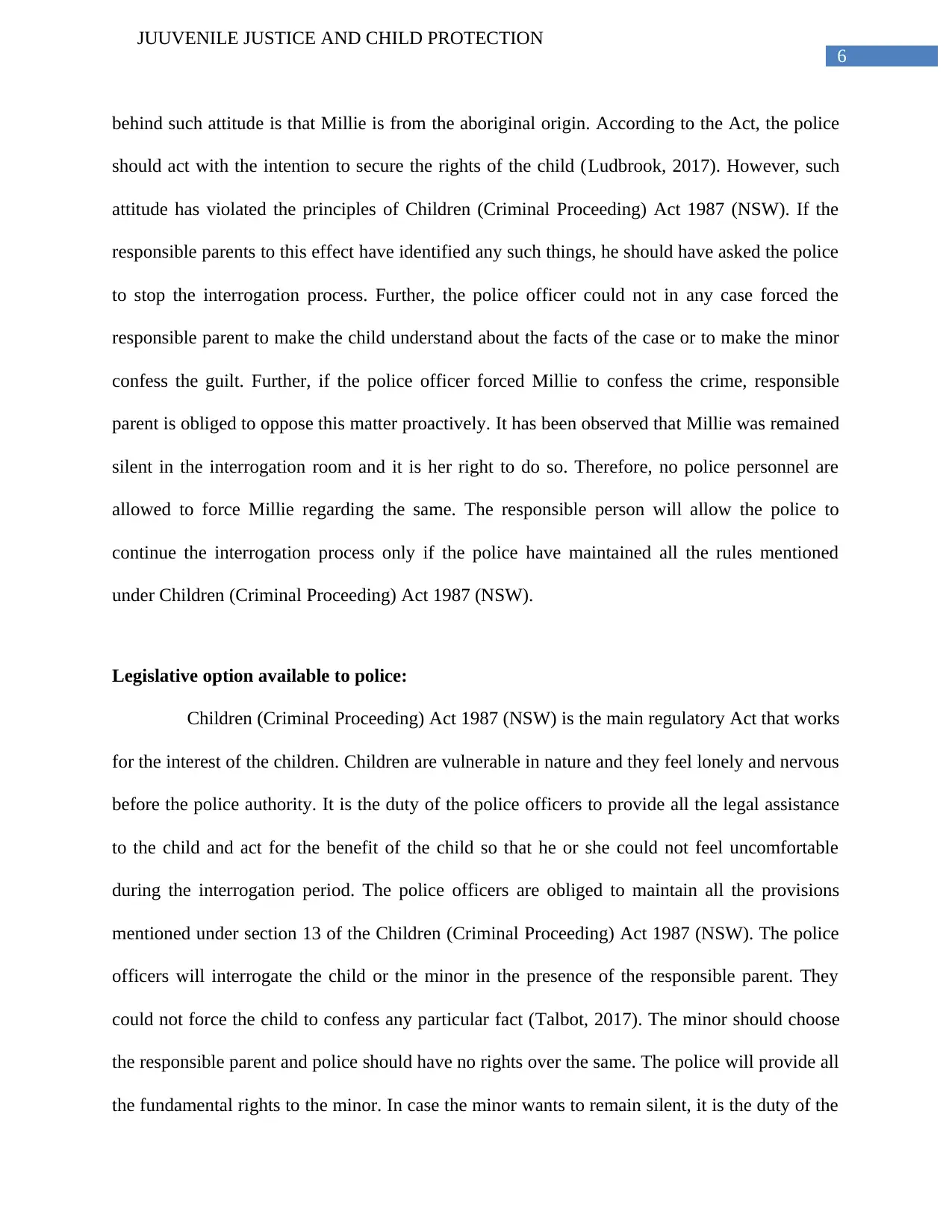
6
JUUVENILE JUSTICE AND CHILD PROTECTION
behind such attitude is that Millie is from the aboriginal origin. According to the Act, the police
should act with the intention to secure the rights of the child (Ludbrook, 2017). However, such
attitude has violated the principles of Children (Criminal Proceeding) Act 1987 (NSW). If the
responsible parents to this effect have identified any such things, he should have asked the police
to stop the interrogation process. Further, the police officer could not in any case forced the
responsible parent to make the child understand about the facts of the case or to make the minor
confess the guilt. Further, if the police officer forced Millie to confess the crime, responsible
parent is obliged to oppose this matter proactively. It has been observed that Millie was remained
silent in the interrogation room and it is her right to do so. Therefore, no police personnel are
allowed to force Millie regarding the same. The responsible person will allow the police to
continue the interrogation process only if the police have maintained all the rules mentioned
under Children (Criminal Proceeding) Act 1987 (NSW).
Legislative option available to police:
Children (Criminal Proceeding) Act 1987 (NSW) is the main regulatory Act that works
for the interest of the children. Children are vulnerable in nature and they feel lonely and nervous
before the police authority. It is the duty of the police officers to provide all the legal assistance
to the child and act for the benefit of the child so that he or she could not feel uncomfortable
during the interrogation period. The police officers are obliged to maintain all the provisions
mentioned under section 13 of the Children (Criminal Proceeding) Act 1987 (NSW). The police
officers will interrogate the child or the minor in the presence of the responsible parent. They
could not force the child to confess any particular fact (Talbot, 2017). The minor should choose
the responsible parent and police should have no rights over the same. The police will provide all
the fundamental rights to the minor. In case the minor wants to remain silent, it is the duty of the
JUUVENILE JUSTICE AND CHILD PROTECTION
behind such attitude is that Millie is from the aboriginal origin. According to the Act, the police
should act with the intention to secure the rights of the child (Ludbrook, 2017). However, such
attitude has violated the principles of Children (Criminal Proceeding) Act 1987 (NSW). If the
responsible parents to this effect have identified any such things, he should have asked the police
to stop the interrogation process. Further, the police officer could not in any case forced the
responsible parent to make the child understand about the facts of the case or to make the minor
confess the guilt. Further, if the police officer forced Millie to confess the crime, responsible
parent is obliged to oppose this matter proactively. It has been observed that Millie was remained
silent in the interrogation room and it is her right to do so. Therefore, no police personnel are
allowed to force Millie regarding the same. The responsible person will allow the police to
continue the interrogation process only if the police have maintained all the rules mentioned
under Children (Criminal Proceeding) Act 1987 (NSW).
Legislative option available to police:
Children (Criminal Proceeding) Act 1987 (NSW) is the main regulatory Act that works
for the interest of the children. Children are vulnerable in nature and they feel lonely and nervous
before the police authority. It is the duty of the police officers to provide all the legal assistance
to the child and act for the benefit of the child so that he or she could not feel uncomfortable
during the interrogation period. The police officers are obliged to maintain all the provisions
mentioned under section 13 of the Children (Criminal Proceeding) Act 1987 (NSW). The police
officers will interrogate the child or the minor in the presence of the responsible parent. They
could not force the child to confess any particular fact (Talbot, 2017). The minor should choose
the responsible parent and police should have no rights over the same. The police will provide all
the fundamental rights to the minor. In case the minor wants to remain silent, it is the duty of the
Paraphrase This Document
Need a fresh take? Get an instant paraphrase of this document with our AI Paraphraser
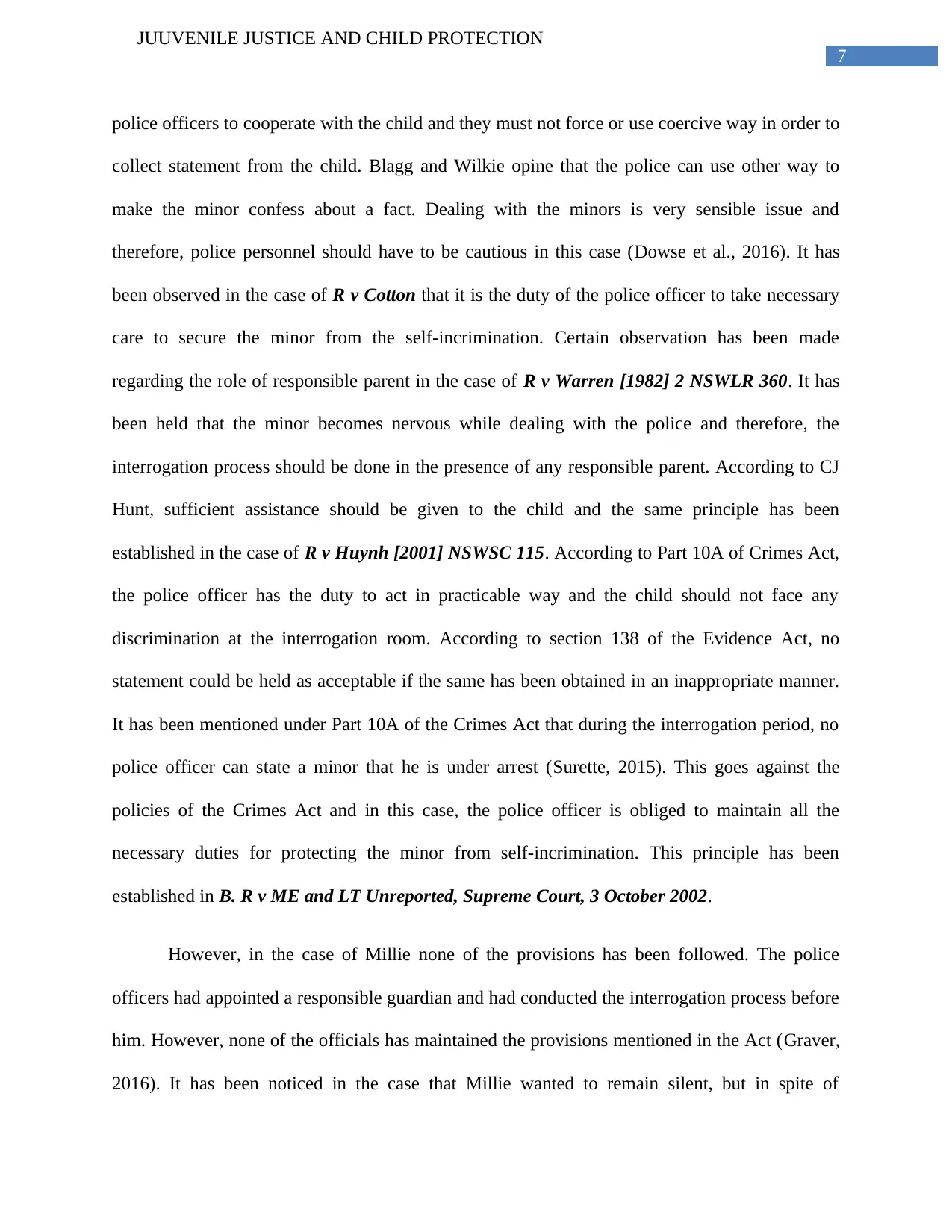
7
JUUVENILE JUSTICE AND CHILD PROTECTION
police officers to cooperate with the child and they must not force or use coercive way in order to
collect statement from the child. Blagg and Wilkie opine that the police can use other way to
make the minor confess about a fact. Dealing with the minors is very sensible issue and
therefore, police personnel should have to be cautious in this case (Dowse et al., 2016). It has
been observed in the case of R v Cotton that it is the duty of the police officer to take necessary
care to secure the minor from the self-incrimination. Certain observation has been made
regarding the role of responsible parent in the case of R v Warren [1982] 2 NSWLR 360. It has
been held that the minor becomes nervous while dealing with the police and therefore, the
interrogation process should be done in the presence of any responsible parent. According to CJ
Hunt, sufficient assistance should be given to the child and the same principle has been
established in the case of R v Huynh [2001] NSWSC 115. According to Part 10A of Crimes Act,
the police officer has the duty to act in practicable way and the child should not face any
discrimination at the interrogation room. According to section 138 of the Evidence Act, no
statement could be held as acceptable if the same has been obtained in an inappropriate manner.
It has been mentioned under Part 10A of the Crimes Act that during the interrogation period, no
police officer can state a minor that he is under arrest (Surette, 2015). This goes against the
policies of the Crimes Act and in this case, the police officer is obliged to maintain all the
necessary duties for protecting the minor from self-incrimination. This principle has been
established in B. R v ME and LT Unreported, Supreme Court, 3 October 2002.
However, in the case of Millie none of the provisions has been followed. The police
officers had appointed a responsible guardian and had conducted the interrogation process before
him. However, none of the officials has maintained the provisions mentioned in the Act (Graver,
2016). It has been noticed in the case that Millie wanted to remain silent, but in spite of
JUUVENILE JUSTICE AND CHILD PROTECTION
police officers to cooperate with the child and they must not force or use coercive way in order to
collect statement from the child. Blagg and Wilkie opine that the police can use other way to
make the minor confess about a fact. Dealing with the minors is very sensible issue and
therefore, police personnel should have to be cautious in this case (Dowse et al., 2016). It has
been observed in the case of R v Cotton that it is the duty of the police officer to take necessary
care to secure the minor from the self-incrimination. Certain observation has been made
regarding the role of responsible parent in the case of R v Warren [1982] 2 NSWLR 360. It has
been held that the minor becomes nervous while dealing with the police and therefore, the
interrogation process should be done in the presence of any responsible parent. According to CJ
Hunt, sufficient assistance should be given to the child and the same principle has been
established in the case of R v Huynh [2001] NSWSC 115. According to Part 10A of Crimes Act,
the police officer has the duty to act in practicable way and the child should not face any
discrimination at the interrogation room. According to section 138 of the Evidence Act, no
statement could be held as acceptable if the same has been obtained in an inappropriate manner.
It has been mentioned under Part 10A of the Crimes Act that during the interrogation period, no
police officer can state a minor that he is under arrest (Surette, 2015). This goes against the
policies of the Crimes Act and in this case, the police officer is obliged to maintain all the
necessary duties for protecting the minor from self-incrimination. This principle has been
established in B. R v ME and LT Unreported, Supreme Court, 3 October 2002.
However, in the case of Millie none of the provisions has been followed. The police
officers had appointed a responsible guardian and had conducted the interrogation process before
him. However, none of the officials has maintained the provisions mentioned in the Act (Graver,
2016). It has been noticed in the case that Millie wanted to remain silent, but in spite of
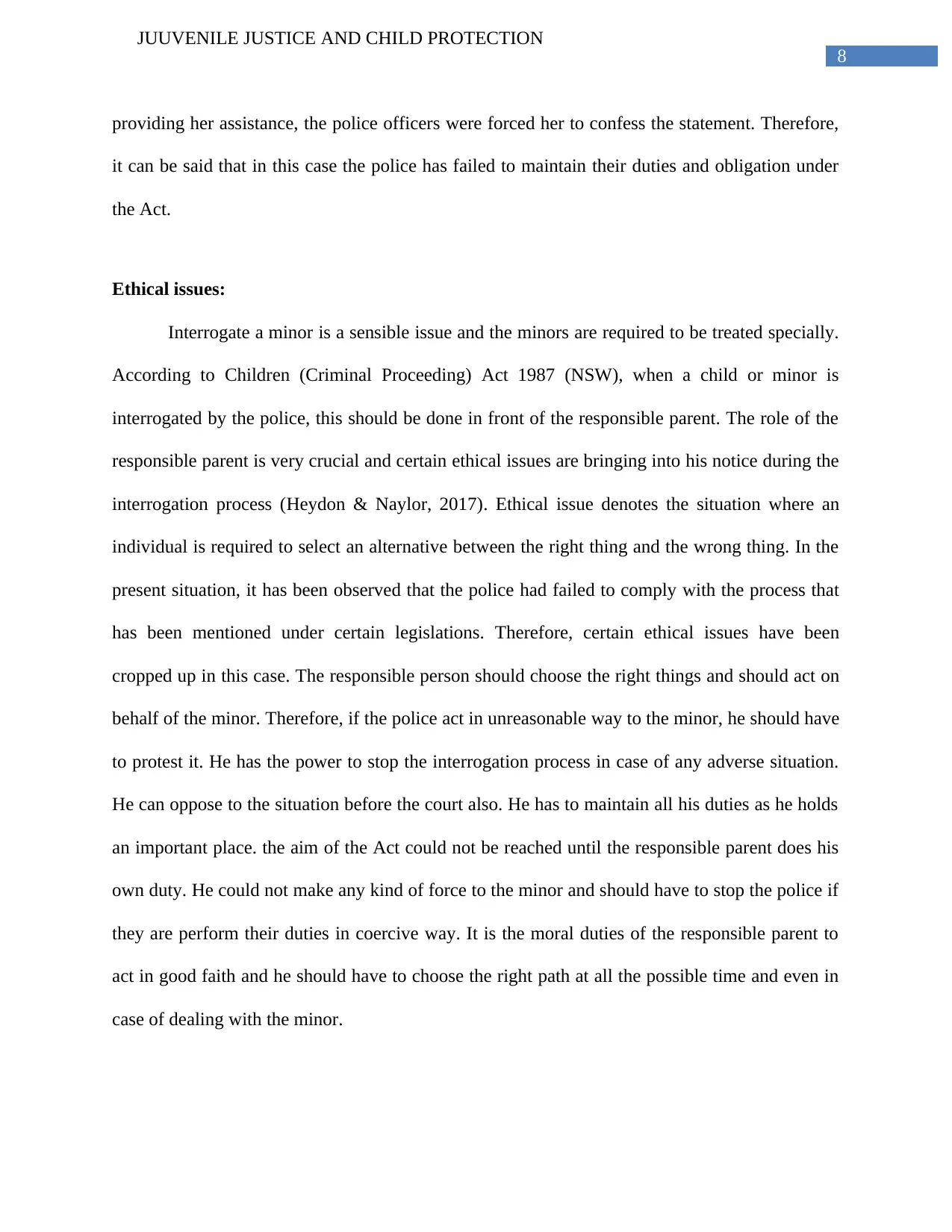
8
JUUVENILE JUSTICE AND CHILD PROTECTION
providing her assistance, the police officers were forced her to confess the statement. Therefore,
it can be said that in this case the police has failed to maintain their duties and obligation under
the Act.
Ethical issues:
Interrogate a minor is a sensible issue and the minors are required to be treated specially.
According to Children (Criminal Proceeding) Act 1987 (NSW), when a child or minor is
interrogated by the police, this should be done in front of the responsible parent. The role of the
responsible parent is very crucial and certain ethical issues are bringing into his notice during the
interrogation process (Heydon & Naylor, 2017). Ethical issue denotes the situation where an
individual is required to select an alternative between the right thing and the wrong thing. In the
present situation, it has been observed that the police had failed to comply with the process that
has been mentioned under certain legislations. Therefore, certain ethical issues have been
cropped up in this case. The responsible person should choose the right things and should act on
behalf of the minor. Therefore, if the police act in unreasonable way to the minor, he should have
to protest it. He has the power to stop the interrogation process in case of any adverse situation.
He can oppose to the situation before the court also. He has to maintain all his duties as he holds
an important place. the aim of the Act could not be reached until the responsible parent does his
own duty. He could not make any kind of force to the minor and should have to stop the police if
they are perform their duties in coercive way. It is the moral duties of the responsible parent to
act in good faith and he should have to choose the right path at all the possible time and even in
case of dealing with the minor.
JUUVENILE JUSTICE AND CHILD PROTECTION
providing her assistance, the police officers were forced her to confess the statement. Therefore,
it can be said that in this case the police has failed to maintain their duties and obligation under
the Act.
Ethical issues:
Interrogate a minor is a sensible issue and the minors are required to be treated specially.
According to Children (Criminal Proceeding) Act 1987 (NSW), when a child or minor is
interrogated by the police, this should be done in front of the responsible parent. The role of the
responsible parent is very crucial and certain ethical issues are bringing into his notice during the
interrogation process (Heydon & Naylor, 2017). Ethical issue denotes the situation where an
individual is required to select an alternative between the right thing and the wrong thing. In the
present situation, it has been observed that the police had failed to comply with the process that
has been mentioned under certain legislations. Therefore, certain ethical issues have been
cropped up in this case. The responsible person should choose the right things and should act on
behalf of the minor. Therefore, if the police act in unreasonable way to the minor, he should have
to protest it. He has the power to stop the interrogation process in case of any adverse situation.
He can oppose to the situation before the court also. He has to maintain all his duties as he holds
an important place. the aim of the Act could not be reached until the responsible parent does his
own duty. He could not make any kind of force to the minor and should have to stop the police if
they are perform their duties in coercive way. It is the moral duties of the responsible parent to
act in good faith and he should have to choose the right path at all the possible time and even in
case of dealing with the minor.
⊘ This is a preview!⊘
Do you want full access?
Subscribe today to unlock all pages.

Trusted by 1+ million students worldwide
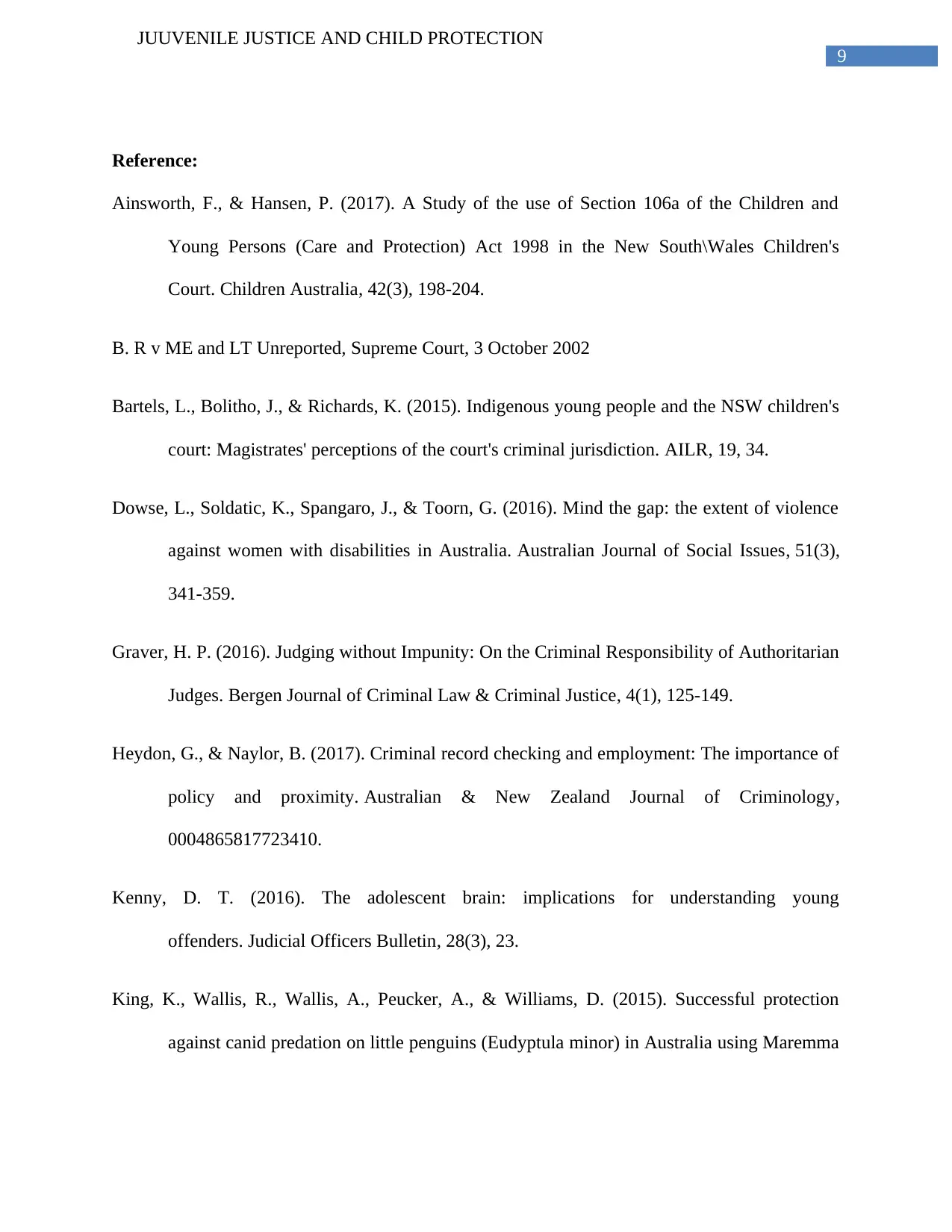
9
JUUVENILE JUSTICE AND CHILD PROTECTION
Reference:
Ainsworth, F., & Hansen, P. (2017). A Study of the use of Section 106a of the Children and
Young Persons (Care and Protection) Act 1998 in the New South\Wales Children's
Court. Children Australia, 42(3), 198-204.
B. R v ME and LT Unreported, Supreme Court, 3 October 2002
Bartels, L., Bolitho, J., & Richards, K. (2015). Indigenous young people and the NSW children's
court: Magistrates' perceptions of the court's criminal jurisdiction. AILR, 19, 34.
Dowse, L., Soldatic, K., Spangaro, J., & Toorn, G. (2016). Mind the gap: the extent of violence
against women with disabilities in Australia. Australian Journal of Social Issues, 51(3),
341-359.
Graver, H. P. (2016). Judging without Impunity: On the Criminal Responsibility of Authoritarian
Judges. Bergen Journal of Criminal Law & Criminal Justice, 4(1), 125-149.
Heydon, G., & Naylor, B. (2017). Criminal record checking and employment: The importance of
policy and proximity. Australian & New Zealand Journal of Criminology,
0004865817723410.
Kenny, D. T. (2016). The adolescent brain: implications for understanding young
offenders. Judicial Officers Bulletin, 28(3), 23.
King, K., Wallis, R., Wallis, A., Peucker, A., & Williams, D. (2015). Successful protection
against canid predation on little penguins (Eudyptula minor) in Australia using Maremma
JUUVENILE JUSTICE AND CHILD PROTECTION
Reference:
Ainsworth, F., & Hansen, P. (2017). A Study of the use of Section 106a of the Children and
Young Persons (Care and Protection) Act 1998 in the New South\Wales Children's
Court. Children Australia, 42(3), 198-204.
B. R v ME and LT Unreported, Supreme Court, 3 October 2002
Bartels, L., Bolitho, J., & Richards, K. (2015). Indigenous young people and the NSW children's
court: Magistrates' perceptions of the court's criminal jurisdiction. AILR, 19, 34.
Dowse, L., Soldatic, K., Spangaro, J., & Toorn, G. (2016). Mind the gap: the extent of violence
against women with disabilities in Australia. Australian Journal of Social Issues, 51(3),
341-359.
Graver, H. P. (2016). Judging without Impunity: On the Criminal Responsibility of Authoritarian
Judges. Bergen Journal of Criminal Law & Criminal Justice, 4(1), 125-149.
Heydon, G., & Naylor, B. (2017). Criminal record checking and employment: The importance of
policy and proximity. Australian & New Zealand Journal of Criminology,
0004865817723410.
Kenny, D. T. (2016). The adolescent brain: implications for understanding young
offenders. Judicial Officers Bulletin, 28(3), 23.
King, K., Wallis, R., Wallis, A., Peucker, A., & Williams, D. (2015). Successful protection
against canid predation on little penguins (Eudyptula minor) in Australia using Maremma
Paraphrase This Document
Need a fresh take? Get an instant paraphrase of this document with our AI Paraphraser
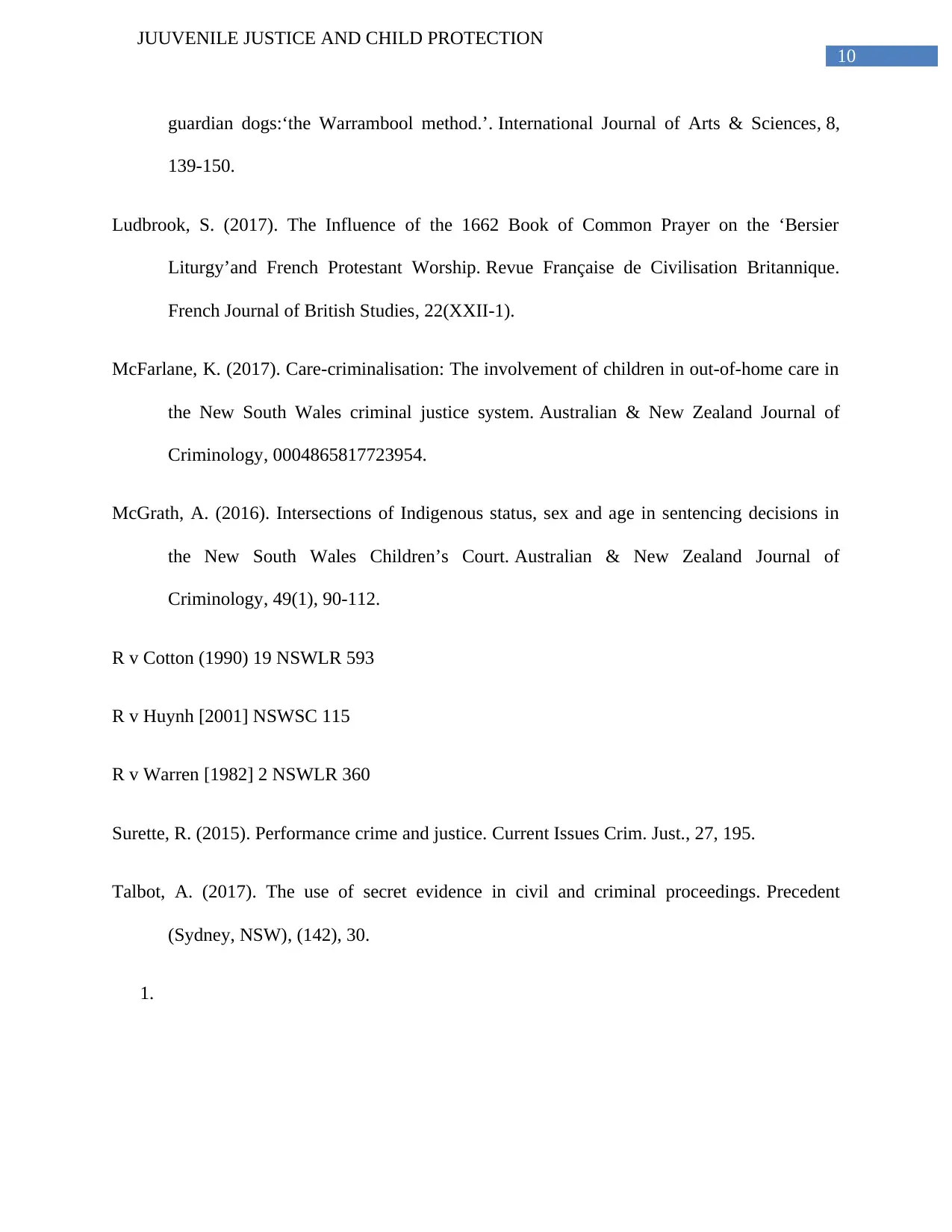
10
JUUVENILE JUSTICE AND CHILD PROTECTION
guardian dogs:‘the Warrambool method.’. International Journal of Arts & Sciences, 8,
139-150.
Ludbrook, S. (2017). The Influence of the 1662 Book of Common Prayer on the ‘Bersier
Liturgy’and French Protestant Worship. Revue Française de Civilisation Britannique.
French Journal of British Studies, 22(XXII-1).
McFarlane, K. (2017). Care-criminalisation: The involvement of children in out-of-home care in
the New South Wales criminal justice system. Australian & New Zealand Journal of
Criminology, 0004865817723954.
McGrath, A. (2016). Intersections of Indigenous status, sex and age in sentencing decisions in
the New South Wales Children’s Court. Australian & New Zealand Journal of
Criminology, 49(1), 90-112.
R v Cotton (1990) 19 NSWLR 593
R v Huynh [2001] NSWSC 115
R v Warren [1982] 2 NSWLR 360
Surette, R. (2015). Performance crime and justice. Current Issues Crim. Just., 27, 195.
Talbot, A. (2017). The use of secret evidence in civil and criminal proceedings. Precedent
(Sydney, NSW), (142), 30.
1.
JUUVENILE JUSTICE AND CHILD PROTECTION
guardian dogs:‘the Warrambool method.’. International Journal of Arts & Sciences, 8,
139-150.
Ludbrook, S. (2017). The Influence of the 1662 Book of Common Prayer on the ‘Bersier
Liturgy’and French Protestant Worship. Revue Française de Civilisation Britannique.
French Journal of British Studies, 22(XXII-1).
McFarlane, K. (2017). Care-criminalisation: The involvement of children in out-of-home care in
the New South Wales criminal justice system. Australian & New Zealand Journal of
Criminology, 0004865817723954.
McGrath, A. (2016). Intersections of Indigenous status, sex and age in sentencing decisions in
the New South Wales Children’s Court. Australian & New Zealand Journal of
Criminology, 49(1), 90-112.
R v Cotton (1990) 19 NSWLR 593
R v Huynh [2001] NSWSC 115
R v Warren [1982] 2 NSWLR 360
Surette, R. (2015). Performance crime and justice. Current Issues Crim. Just., 27, 195.
Talbot, A. (2017). The use of secret evidence in civil and criminal proceedings. Precedent
(Sydney, NSW), (142), 30.
1.

11
JUUVENILE JUSTICE AND CHILD PROTECTION
JUUVENILE JUSTICE AND CHILD PROTECTION
⊘ This is a preview!⊘
Do you want full access?
Subscribe today to unlock all pages.

Trusted by 1+ million students worldwide
1 out of 12
Related Documents
Your All-in-One AI-Powered Toolkit for Academic Success.
+13062052269
info@desklib.com
Available 24*7 on WhatsApp / Email
![[object Object]](/_next/static/media/star-bottom.7253800d.svg)
Unlock your academic potential
Copyright © 2020–2026 A2Z Services. All Rights Reserved. Developed and managed by ZUCOL.





